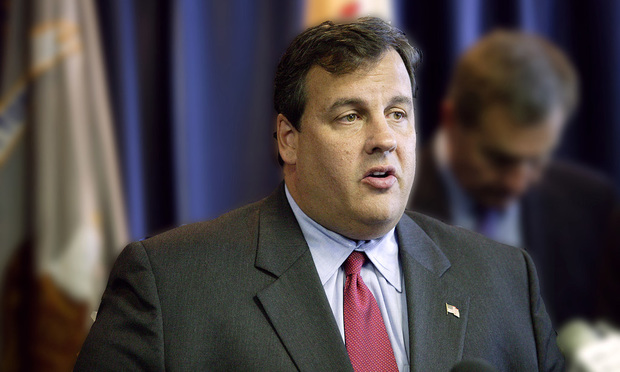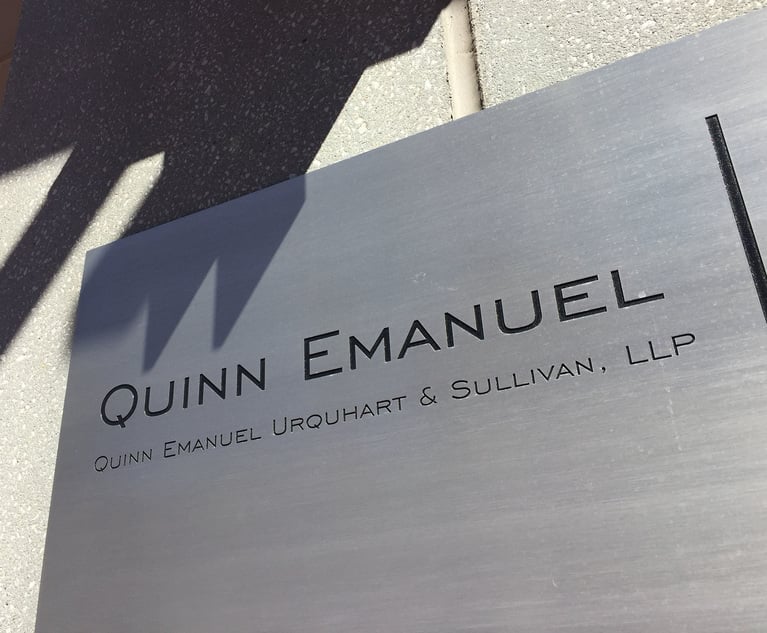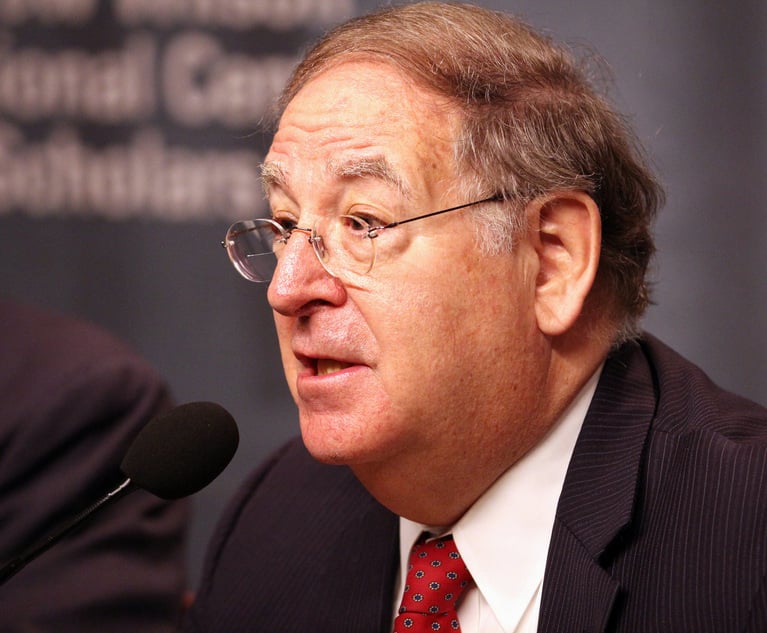Justices Lean Toward Allowing Sports Betting in Clash Over State Sovereignty
New Jersey Gov. Chris Christie, who has fought for years to overturn the federal law, watched the argument from the front row of the Supreme Court bar section.
December 04, 2017 at 02:28 PM
4 minute read

The U.S. Supreme Court seemed ready on Monday to strike down the federal law that bans most states from licensing sports betting, though not by a unanimous vote.
Arguing in the case Christie v. NCAA, Gibson, Dunn & Crutcher partner Theodore Olson appeared to persuade several justices that the 1992 Professional and Amateur Sports Protection Act infringes on state sovereignty and amounts to “commandeering” states to do the federal government's bidding.
Olson acknowledged that the federal government may pre-empt state activities like allowing sports gambling under its powers to regulate commerce but, he asserted, only when it actually imposes a comprehensive regulatory scheme of its own that would render state actions inconsistent.
“PASPA is a direct command to the states without any effort to regulate sports wagering,” Olson told the justices. He added that the federal government wanted to “put the burden and expense and accountability all on the states.”
New Jersey Gov. Chris Christie, who has fought for years to overturn the federal law, watched the argument from the front row of the Supreme Court bar section.
A Seton Hall University School of Law graduate and former U.S. attorney, Christie joined the Supreme Court bar just before the argument began. Olson moved for Christie's admission, along with several other lawyers, and Chief Justice John Roberts Jr. said the motion was granted.
At a press conference after the argument, Christie predicted that “We're going to do well,” and Olson sounded optimistic as well.
Not a word was spoken—or a question asked—during the arguments about the potential consequences of striking down the law, namely the expansion of sports gambling across the nation. It is currently a mostly illegal activity that, according to the American Gaming Association, “has grown to a $150 billion-a-year industry.”
Association president Geoff Freeman said in a statement, “Today is a positive day for the millions of Americans seeking to legally wager on sporting events. … The justices of the Court expressed deep interest in the role of the federal government—a role that we believe has created a thriving illegal market that has driven trillions of dollars to offshore websites and corner bookies.”
Justice Elena Kagan pushed back against Olson's argument, asserting that a federal law that tells a state not to do something “sounds to me like the language of pre-emption,” which is permissible. Justice Sonia Sotomayor also seemed skeptical, but other justices appeared to accept Olson's formulation.
Paul Clement of Kirkland & Ellis rose to defend the law on behalf of the National Football League, National Basketball Association, Major League Baseball, the National Hockey League and the National Collegiate Athletic Association, and soon ran into obstacles.
“The citizens of the State of New Jersey are bound to obey a law that the state doesn't want but that the federal government compels the state to have,” Justice Anthony Kennedy said. “That seems like commandeering.”
Roberts asked Clement if Congress could forbid states to impose income taxes higher than 6 percent. When Clement said it was possible under court precedent, Roberts said that would “go to the fundamental powers and prerogatives of a state.”
Deputy Solicitor General Jeffrey Wall, also defending the law, said that Olson's assertion that federal law can pre-empt state law only when the federal government promulgates a comprehensive regulatory scheme is “a made-up principle.” But other justices did not pick up on the point.
This content has been archived. It is available through our partners, LexisNexis® and Bloomberg Law.
To view this content, please continue to their sites.
Not a Lexis Subscriber?
Subscribe Now
Not a Bloomberg Law Subscriber?
Subscribe Now
NOT FOR REPRINT
© 2025 ALM Global, LLC, All Rights Reserved. Request academic re-use from www.copyright.com. All other uses, submit a request to [email protected]. For more information visit Asset & Logo Licensing.
You Might Like
View All
Trump Administration Faces Legal Challenge Over EO Impacting Federal Workers
3 minute read
Private Equity Giant KKR Refiles SDNY Countersuit in DOJ Premerger Filing Row
3 minute read
Quinn Emanuel Files Countersuit Against DOJ in Row Over Premerger Reporting
3 minute read
'Thoughtful Jurist': Maryland US District Senior Judge Messitte Dies After Short Illness
4 minute readTrending Stories
- 1Data Disposition—Conquering the Seemingly Unscalable Mountain
- 2Who Are the Judges Assigned to Challenges to Trump’s Birthright Citizenship Order?
- 3Litigators of the Week: A Directed Verdict Win for Cisco in a West Texas Patent Case
- 4Litigator of the Week Runners-Up and Shout-Outs
- 5Womble Bond Becomes First Firm in UK to Roll Out AI Tool Firmwide
Who Got The Work
J. Brugh Lower of Gibbons has entered an appearance for industrial equipment supplier Devco Corporation in a pending trademark infringement lawsuit. The suit, accusing the defendant of selling knock-off Graco products, was filed Dec. 18 in New Jersey District Court by Rivkin Radler on behalf of Graco Inc. and Graco Minnesota. The case, assigned to U.S. District Judge Zahid N. Quraishi, is 3:24-cv-11294, Graco Inc. et al v. Devco Corporation.
Who Got The Work
Rebecca Maller-Stein and Kent A. Yalowitz of Arnold & Porter Kaye Scholer have entered their appearances for Hanaco Venture Capital and its executives, Lior Prosor and David Frankel, in a pending securities lawsuit. The action, filed on Dec. 24 in New York Southern District Court by Zell, Aron & Co. on behalf of Goldeneye Advisors, accuses the defendants of negligently and fraudulently managing the plaintiff's $1 million investment. The case, assigned to U.S. District Judge Vernon S. Broderick, is 1:24-cv-09918, Goldeneye Advisors, LLC v. Hanaco Venture Capital, Ltd. et al.
Who Got The Work
Attorneys from A&O Shearman has stepped in as defense counsel for Toronto-Dominion Bank and other defendants in a pending securities class action. The suit, filed Dec. 11 in New York Southern District Court by Bleichmar Fonti & Auld, accuses the defendants of concealing the bank's 'pervasive' deficiencies in regards to its compliance with the Bank Secrecy Act and the quality of its anti-money laundering controls. The case, assigned to U.S. District Judge Arun Subramanian, is 1:24-cv-09445, Gonzalez v. The Toronto-Dominion Bank et al.
Who Got The Work
Crown Castle International, a Pennsylvania company providing shared communications infrastructure, has turned to Luke D. Wolf of Gordon Rees Scully Mansukhani to fend off a pending breach-of-contract lawsuit. The court action, filed Nov. 25 in Michigan Eastern District Court by Hooper Hathaway PC on behalf of The Town Residences LLC, accuses Crown Castle of failing to transfer approximately $30,000 in utility payments from T-Mobile in breach of a roof-top lease and assignment agreement. The case, assigned to U.S. District Judge Susan K. Declercq, is 2:24-cv-13131, The Town Residences LLC v. T-Mobile US, Inc. et al.
Who Got The Work
Wilfred P. Coronato and Daniel M. Schwartz of McCarter & English have stepped in as defense counsel to Electrolux Home Products Inc. in a pending product liability lawsuit. The court action, filed Nov. 26 in New York Eastern District Court by Poulos Lopiccolo PC and Nagel Rice LLP on behalf of David Stern, alleges that the defendant's refrigerators’ drawers and shelving repeatedly break and fall apart within months after purchase. The case, assigned to U.S. District Judge Joan M. Azrack, is 2:24-cv-08204, Stern v. Electrolux Home Products, Inc.
Featured Firms
Law Offices of Gary Martin Hays & Associates, P.C.
(470) 294-1674
Law Offices of Mark E. Salomone
(857) 444-6468
Smith & Hassler
(713) 739-1250










